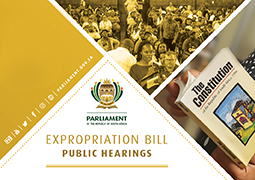
Parliament, Friday, 26 August 2021 – The Portfolio Committee on Public Works and Infrastructure was cautioned by residents of Mangaung Metropolitan Municipality that the adoption of the Expropriation Bill has the potential to exacerbate South Africa’s high rate of poverty. The committee held the first of four public hearings on the Expropriation Bill in the Free State, where the majority of the participants at the hearing objected to the Bill.
The primary reason for their objection was the perceived threat to orderly agricultural development, especially within the context of Free State commercial agriculture sector’s strategic role in securing food security and driving growth in South Africa’s gross domestic product. They also objected to what they saw as an unfair bias against the rights of property owners, many of whom had worked hard to accumulate property.
Those opposing the bill were concerned that it will worsen poverty. They said it could have unintended consequences for the poor, as it would stunt economic growth and increase unemployment.
Participants in the hearings were also concerned that the lack of a clear definition of intangible property poses a risk to other forms of property, such as pensions, copyright and shares, and thus threatens the constitutionally enshrined right to own property. They called for intangible property to be removed from the bill. In addition, they said that the bill does not deal adequately with the issue of mortgages, with concerns that if an owner of an expropriated property is paid less than what they owed the financial institution they might be liable for the difference.
Other participants in the hearings supported the bill, primarily because of its potential to unlock economic development, especially in rural areas. There was also a strong view that it could be a tool to bring redress against historic acts of dispossession.
Young emerging farmers emphasised to the committee that they have dreams and aspirations to become commercial farmers, but are currently unable to do so because they do not own land. They are frustrated in their drive to contribute to agricultural development and job creation. Traditional leaders highlighted that they should be an appropriating authority, in light of their historical role as custodians of the land.
Those in support of the bill also raised the need for fairness and equitable participation in South Africa’s economic fortunes, as this would limit protests and perceived unfairness created by inequality and lack of transformation.
The committee will tomorrow continue with public hearings in Welkom in the Free State.
ISSUED BY THE PARLIAMENTARY COMMUNICATION SERVICES ON BEHALF OF THE CHAIRPERSON OF THE PORTFOLIO COMMITTEE ON PUBLIC WORKS AND INFRASTRUCTURE, MS NOLITHA NTOBONGWANA
For media enquiries or interviews with the Chairperson, please contact the committee’s Media Officer:
Name: Malatswa Molepo (Mr)
Parliamentary Communication Services
Tel: 021 403 8438
Cell: 081 512 7920
E-mail: mmolepo@parliament.gov.za

